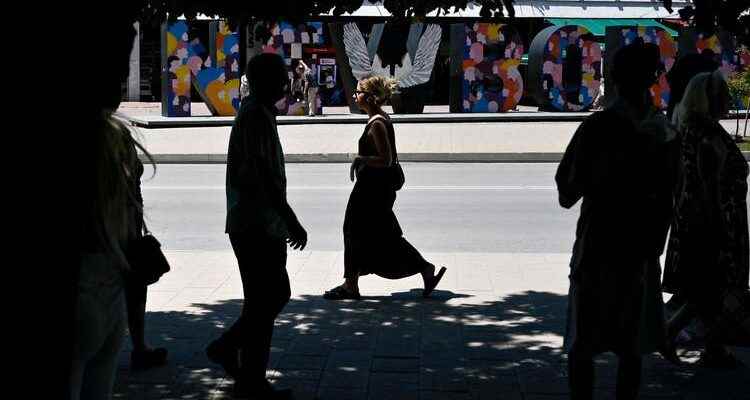Many people want to leave Kosovo. But there are also those who return. They want to support the youngest state in Europe, but also change it: with money, know-how or political commitment.
Pristina: passers-by in front of the “Newborn” monument, which commemorates the 2008 declaration of independence.
For Valon Asani, Kosovo is the land of opportunity. His story sounds a bit like a fairy tale. He tells them in a broad Eastern Swiss dialect in a chic café in a new building on the outskirts of Pristina.
Eleven years ago he came to Kosovo from Switzerland, to the home of his parents, whom he only knew from vacations. “With 3000 francs saved – very naive,” he says. The computer scientist wanted to start as an entrepreneur in Kosovo immediately after his apprenticeship in Switzerland.
“It was obvious to me,” he says. “I’ve always vacationed here, I could speak the language.” Today, Asani owns three companies: Mik Group offers online marketing, mainly for clients in Switzerland, while most of the employees work in Pristina. Dua (Albanian for “love”) is a dating app aimed primarily at Albanians. And his third company rents out temporary apartments in Pristina – a kind of Kosovar Airbnb.
Around a hundred employees now work for Valon Asani’s company, most of them in Kosovo and only a few in Switzerland. But the start was bumpy. After a year, Asani ran out of money. He returned to Switzerland for a year and got a job to earn money. After work he continued to build up his company in Pristina.
Today Kosovo is the center of his life, he says. He spends 80 percent of his time here. At the beginning he had trouble with the integration. For example, there is a completely different understanding of time here, he says.
“At some point I gave in when it came to punctuality.” Even today, his private environment consists exclusively of people who have lived outside of Kosovo for a long time. “I don’t have a single friend who only lived here.”
The poor infrastructure caused him difficulties when he started out as an entrepreneur: power outages and poor internet connections. That is very different today.
Asani is convinced that the diaspora is more willing to invest in Kosovo today than it was a few years ago. «In the past, a Kosovar Albanian from Switzerland might have wanted to build a house in Kosovo or buy an apartment in Pristina. That has changed.”
Not only the low labor costs make the country interesting for entrepreneurs. “You are left alone by the authorities, I see that as positive.” The need for freedom is strong in Kosovo, which declared its independence in 2008. “Freedom is lived here much more than in Switzerland.”
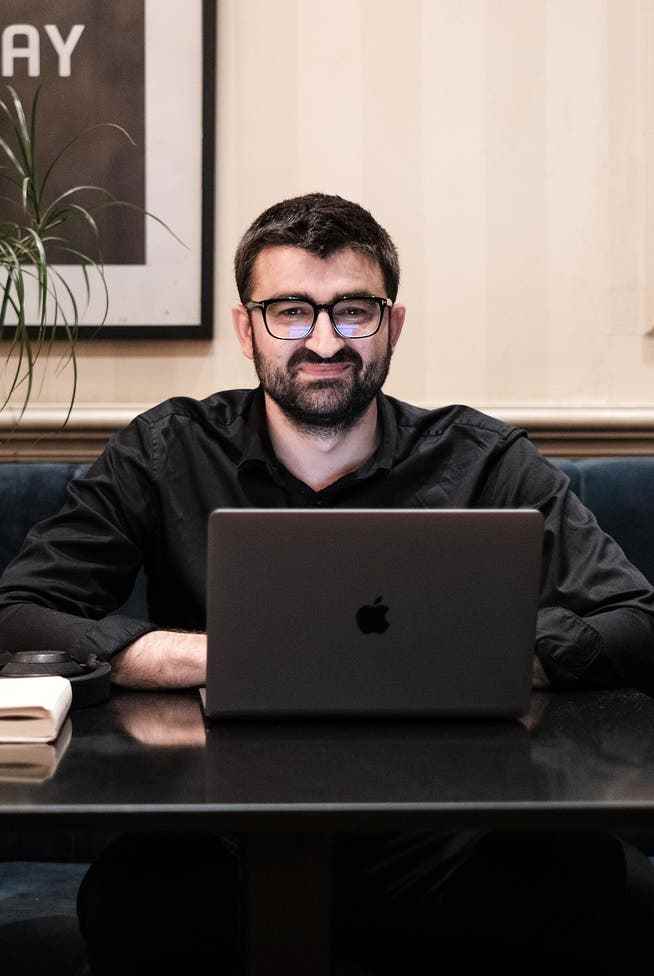
Valon Asani runs three companies with a total of 100 employees, most of whom work in Pristina.
One billion remittances per year
However, if one looks at the available statistics, the greater willingness to invest is not yet apparent. The approximately 400,000 to 600,000 Kosovars living abroad have so far been reluctant to invest in Kosovar companies or to found a company.
Nevertheless, the diaspora is of enormous importance for the economy of Kosovo. Mainly because of the remittances, the money transfers to family members in the country. They have steadily increased over the past few years. In 2021 they accounted for more than one billion euros.
That is around 15 percent of the country’s gross domestic product – significantly more than in the surrounding countries. Ten years ago it wasn’t half as many. More than a fifth of remittances come from Switzerland. Most of the money goes into consumption.
There are also examples like that of the entrepreneur Asani, but these are still rather isolated cases. Foreign direct investment, not only from members of the diaspora, recently accounted for around 5 percent of GDP. In contrast to remittances, direct investment does not increase significantly in a multi-year comparison. The value is also below that in most neighboring countries.
Not just money, but also knowledge
The government of Prime Minister Albin Kurti has therefore set itself the goal of attracting more investors from the diaspora and their environment to the country. But Kosovo is not only interested in money, but also in knowledge from abroad.
Professionals or academics trained in Switzerland, Germany or North America should pass on their specialist knowledge in Kosovo. The strategy for how this is to be done is not due to be published until autumn, but numerous foreign-trained advisers are already working for the government.
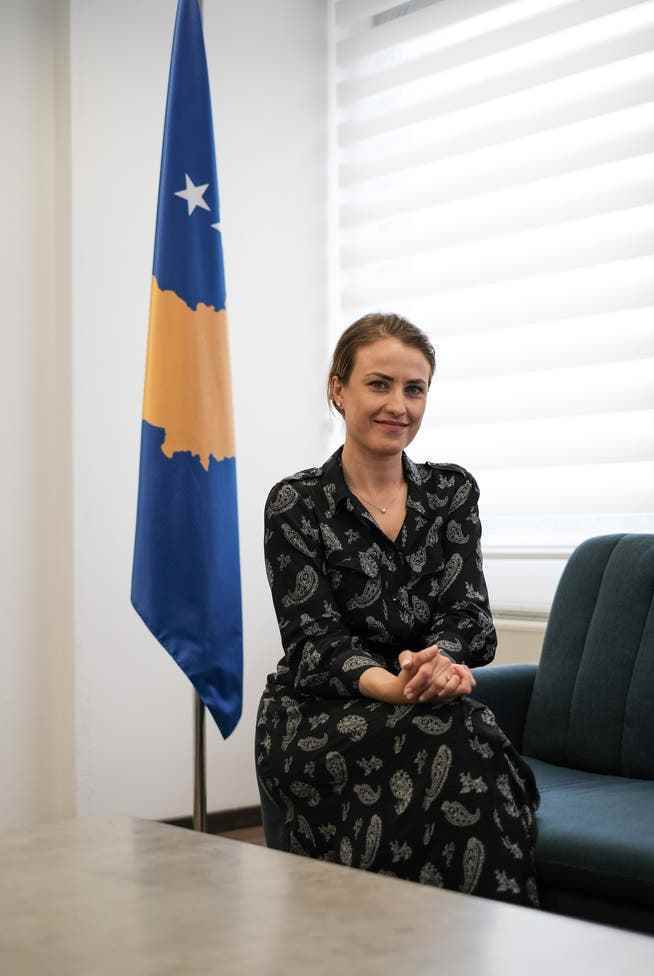
Fellanza Podrimja grew up in Germany and now works as an advisor to the Kosovar Prime Minister Albin Kurti.
One of them is Fellanza Podrimja. She spent thirty years of her life in Germany. She returned to Pristina about two years ago and is now responsible for relations with German-speaking countries in the prime minister’s office.
“I think the diaspora can contribute a lot here,” she says. Podrimja studied political science and public law in Germany, she had a good job in management consulting.
For many people in Kosovo – and also in the diaspora – Prime Minister Kurti and his team are something like the government of last hope. According to surveys, almost 80 percent of 18 to 35 year olds are seriously considering leaving the country.
The expectations of Kurti are huge: he should put an end to systemic corruption and mismanagement. An almost impossible task, at least in the short term. Fellanza Podrimja calls it a “challenge”.
Why did she return, even though she would earn many times as much as a management consultant in Germany? “You can do so much here with so little. If you’re a political person, that’s incentive enough.”
In Kosovo one is thrown into an everyday life that is much less regularly scheduled than in Germany or Switzerland. “You have to fight your way through here. You grow incredibly with such a task.”
She hopes that in the future even more Kosovars will pass on the know-how they have acquired abroad in Kosovo. As an example, she cites the experience of dual vocational training that many members of the diaspora in German-speaking countries have gone through.
These are experiences that they could best convey to the citizens and politicians here. “It’s different than when an international expert explains something in English, you get through it better in your native language,” says Podrimja. In order to pass on knowledge, one does not have to return for a lifetime. That could also only be for half a year, for a specific project.
Fellanza Podrimja herself sees her foreseeable future in Kosovo. But maybe she will live in Germany again. “I have a German homeland and I have an Albanian homeland here in Kosovo. You don’t have to separate that.”
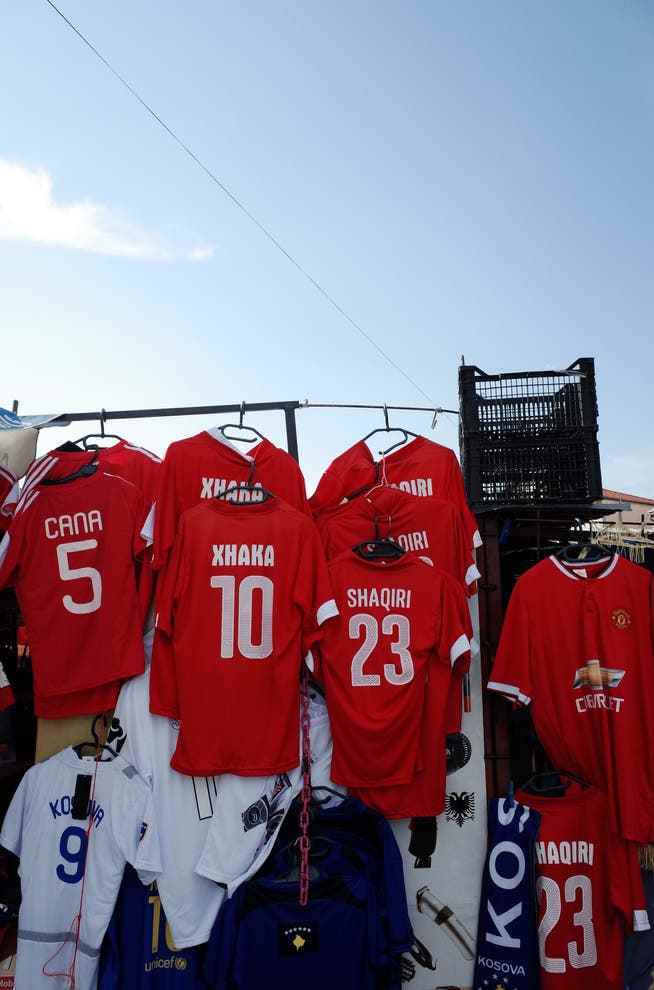
Football shirts worn by Swiss internationals with roots in Kosovo at a market in Pristina: Relations with the diaspora are not only close economically.
“The door is open”
The diaspora is not only financially involved in Kosovo, but also politically. Tens of thousands of voters from abroad take part in parliamentary elections. And this despite considerable hurdles: Since voting is not possible in Kosovan embassies or consulates, they have to accept high postage or travel to Kosovo so that the ballot papers arrive on time. The diaspora is not indifferent to what is happening in the old homeland.
“I am firmly convinced that the engagement of the diaspora is the key to strengthening democracy and the institutions of Kosovo,” says environmental activist Shpresa Loshaj in a video call. She’s tuned in from Canada. She fled there with her family after her house was burned down by Serbian troops during the Kosovo war in the late 1990s.
Shpresa Loshaj now works as a consultant for the Canadian government. For a long time she only returned to her old homeland for occasional vacation visits. But then 2018 came and she became an activist in Kosovo.
That year she revisited the valley a few kilometers above her hometown of Decan, in the mountainous western part of the country, for the first time. Before the war, the Loshaj family used to spend their summers here by the river. But the river didn’t look the way Shpresa Loshaj remembered. He was almost dried up.
The reason: A subsidiary of the Austrian energy group Kelag had built three small hydroelectric power plants. Without the necessary environmental permits, says Loshaj. The power plants were built with the knowledge of the state. “I felt betrayed by the Kosovar authorities.”
Since then she has been fighting at the forefront against the small power plants in Decan. She founded a non-governmental organization, wrote open letters to the Prime Minister and the Austrian Ministry of Foreign Affairs, met Kosovar parliamentarians and the President, and went to court in Kosova. The case is not yet closed.
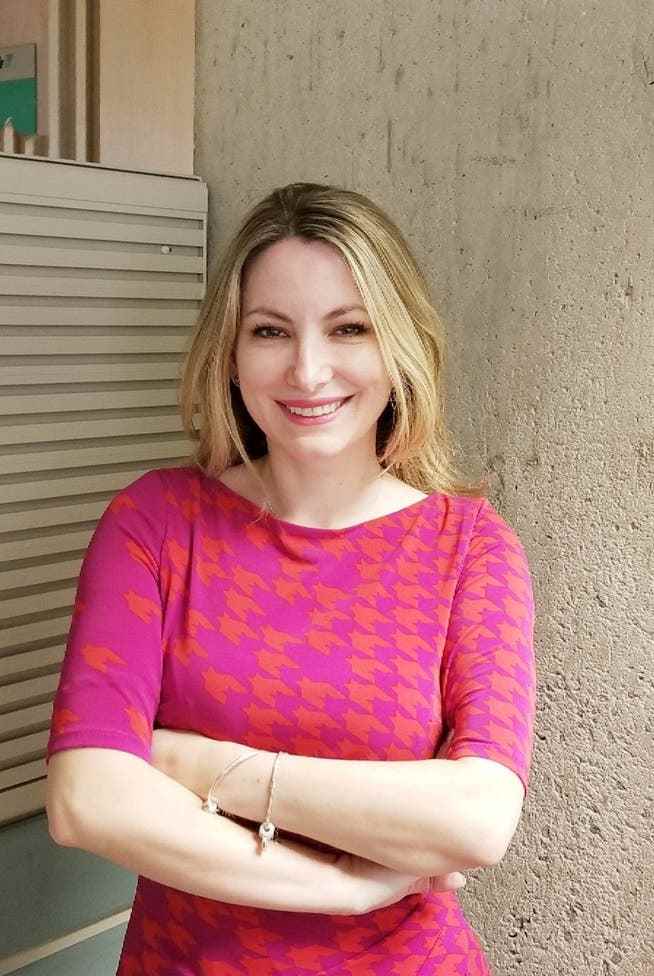
Activist Shpresa Loshaj is considering returning to Kosovo from Canada.
Loshaj is not only concerned with protecting the environment. She also sees her fight as a fight against corruption and for the rule of law. Her “Canadian look” helps her. It’s the perspective of “one of the best democracies in the world,” as she puts it. “I know what democracy means and I’m not ready to simply accept this.”
From their point of view, Kosovo is not yet finished as a state. The country and its people deserve better. So don’t give up. “If I did that, I would give up my idea of Kosovo – a state with strong institutions.” At the moment Loshajs lives in Canada.
She spent a year in Kosovo and devoted herself entirely to her political commitment. “I felt like I belonged there.” Since then she has been thinking about returning. “I tested the country for myself. What it’s like to be there for more than three weeks.” She can imagine Kosovo as her home again, she says. “The door is open.”
